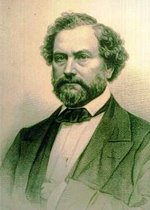At first blush, this might seem like a classic case of the small entrepreneur being stepped on by a mega-corporation and then being helped by the US Patent Office to receive compensation except for one thing: There is no competitive product you can go buy from NTP. NTP has never manufactured a wireless email product. Indeed, they've never manufactured any product. All they do is hold patents.
Not only that, but the US Patent Office is currently investigating NTP's patents and is considered likely to invalidate some or all of their claims. Thus, one of the provisions that NTP insisted on in the settlement was that it not be refundable if the patents were invalidated. (RIM had asked the judge in the case not to issue a BlackBerry shutdown order until the status of the patents was resolved, but the judge refused.)
The RIM/NTP battle is just one instance of an increasingly common phenomenon in the technology sector: 'inventor' companies filing excessively vague patents, never developing any salable product, and then suing any company and develops similar technology. This has caused many in the business world to say that US Patent law requires a fundamental revision -- a concern touched on by this Wharton Business School article on the NTP/RIM case.
The patent office was established based on the constitution's prescription that laws be made "To promote the Progress of Science and useful Arts, by securing for limited Times to Authors and Inventors the exclusive Right to their respective Writings and Discoveries."
The current US Patent situation is described by the USPTO thus:
A patent for an invention is the grant of a property right to the inventor, issued by the United States Patent and Trademark Office. Generally, the term of a new patent is 20 years from the date on which the application for the patent was filed in the United States....Historically, the patent process has proved important in allowing inventors of important products and technologies to get their products to market and establish themselves before being overwhelmed by a wave of imitators who have the advantage of not having had to invest time in research and development.
The right conferred by the patent grant is, in the language of the statute and of the grant itself, "the right to exclude others from making, using, offering for sale, or selling" the invention in the United States or "importing" the invention into the United States. What is granted is not the right to make, use, offer for sale, sell or import, but the right to exclude others from making, using, offering for sale, selling or importing the invention. Once a patent is issued, the patentee must enforce the patent without aid of the USPTO.
 One example which certain readers appreciateiate is that of Samuel Colt and the invention of the 'cap-and-ball' revolver. Colt patented the percussion cap revolver in 1836. That gave him a 20-year lock on the market for a pistol with a revolving cylinder with 5 or 6 chambers closed at the back with an opening on which a percussion cap could be fitted for each chamber and a mechanical cocking device which both advanced the cylinder and prepared the hammer to fall. (Smith & Wesson gained the patent for a revolver with through-bored cylinders into which rimfire cartridges could be loaded.)
One example which certain readers appreciateiate is that of Samuel Colt and the invention of the 'cap-and-ball' revolver. Colt patented the percussion cap revolver in 1836. That gave him a 20-year lock on the market for a pistol with a revolving cylinder with 5 or 6 chambers closed at the back with an opening on which a percussion cap could be fitted for each chamber and a mechanical cocking device which both advanced the cylinder and prepared the hammer to fall. (Smith & Wesson gained the patent for a revolver with through-bored cylinders into which rimfire cartridges could be loaded.)During those twenty years, Colt became a dominant American brand and built itself into a company which would go on to build some of the most famous and trusted guns in American history. It also fought off as many imitators as possible in court, since numerous companies tried to copy their design.
 Here's a picture of the 1860 Army model Colt. During the Civil War, the union purchased 107,000 from Colt for $13.75 a piece.
Here's a picture of the 1860 Army model Colt. During the Civil War, the union purchased 107,000 from Colt for $13.75 a piece.In 1857, the market opened up for other reputable competitors to enter the field. Remington (already a well known gun maker) immediately entered the market with a percussion cap revolver which built on Colt's design but added significant improvements, most notably a solid frame which made the gun stronger, provided a more reliable sight (the Colt's sight was just a groove cut in the cocking hammer), and the ability to switch out an empty cylinder for a loaded one in seconds.
 The 1863 Remington Army Model revolver (I bought a working replica from Dixie Gun Works many years ago, a nice, fun-to-shoot gun) was one of the most prized guns in the Civil War. The Union bought 125,300 during the war. (Site on Civil War revolvers.)
The 1863 Remington Army Model revolver (I bought a working replica from Dixie Gun Works many years ago, a nice, fun-to-shoot gun) was one of the most prized guns in the Civil War. The Union bought 125,300 during the war. (Site on Civil War revolvers.)Now that, it seems to me, is pretty much how the patent system is supposed to work. The patent provides the inventor with a period of protection during which he can bring his product to market, and at the end of that time the market opens up and others can freely improve on the produce without paying any licensing to the original inventor. However, these days there's another approach that more and more 'inventors' are taking. For instance, back in 2002 a company named PanIP (which didn't sell any products, but had a couple patents which they maintained covered pretty much all forms of ecommerce) began suing random small companies with webstores demanding that they pay $30,000 in licensing for the right to have a website that sold things.
An increasing number of people seem to think that this kind of 'intellectual property' is a viable way to make some money. For instance, check out the top comment on this post about the BlackBerry settlement.
Maybe it's having spent some time trying to break into freelance writing a while back, but it seems pretty clear to me that ideas are dcheapheep. Everyone thinks he has great ideas. But it's not having the idea that's important, it's turning that idea into something, whether it's a short story or a gadget or a business model. Thinking about how to do something, filing a patent for it, and then sitting around to see if someone else (without knowing you exist) invents the same thing and makes a successful business of it so you can sue him is not being an inventor, it's abusing the legal system to be an economic leach.
I'm sure the answer to the problem isn't simple. You want the patent system to give protection to an inventor who is seeking help from a larger company to market his invention, and thus, you can't limit patents to people who already have a commercial product. And yet, you also don't want people who've never made any effort to commercialize a product that they happened to think of to run aroharassingsing those who genuinely have invented a product and brought it to market.
But however the system is supposed to work, it sure sounds to me like the Blackberry case is a good example of how it shouldn't.






9 comments:
I admire your ability to weave a discussion of firearms into a post regarding just about any subject matter.
;)
If I had Rick's skills, I could find a way to bring inner beauty into it...
You guys having any contractions yet?
Just some small ones ["just" he says].
The due date is tomorrow, and Sarah has a checkup scheduled with her OB/GYN for tomorrow afternoon. Unless something happens in the meantime, I suspect that Sarah and her doctor will decide to have him break her water on Friday.
Once that happens, our babies come pretty fast.
Yeah Jay, it is pretty cool how he does that. I think you should try incorporating a gratuitous gun pic in every post, D.
I dunno, people might think it was just a more violent manifestation of Tom's cat blogging sulks...
I'm certainly willing to concede that RIM is hardly a paragon of virtue.
That said, unless there's evidence I've never heard about that NTP actually tried to sell their technology to RIM before RIM developed it themselves (or that RIM could credibly be supposed to have heard of NTP's technology and copied it) then I think I'd still have to strongly side with RIM in the dispute.
Part of the problem (in addition to the parallel development situation that you describe) is, I think, the length of patent available. I'm not even sure there should be patents in the software industry, since you can do the same thing in such radically different ways. Code copyright only might be the best way to go. But assuming that software patents are a good idea, I think the protection period should probably only be 3-5 years, which is an eternity in the technology world. It seems idiotic to let one company of individual tie down all rights to any software technology for 20 years.
"One example which certain readers appreciateiate..."
Indeed so! I am partial to the Colt 1851 Navy Model myself.
Here ya go, Darwin. Happy Feast of Saint Patrick.
Why not make it like the homesteader's law? You have to show that you're DOING something a set amount of time in a year....
Post a Comment